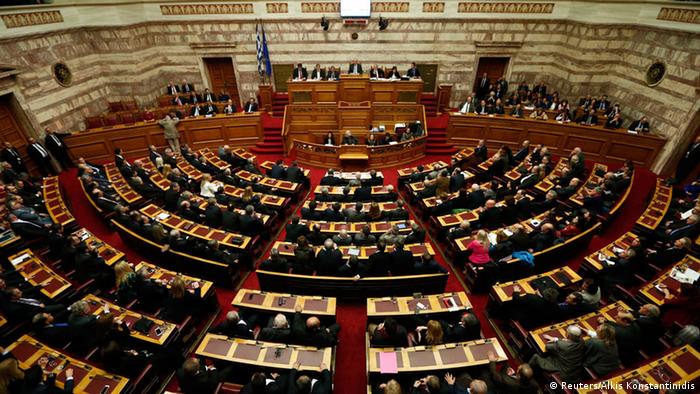EUROZONE CRISIS
Greece headed for elections as lawmakers fail to approve president
Greek voters are set to go to the polls after lawmakers failed to elect a new president. This has triggered a snap election, raising fears that the country's financial bailout could be placed in jeopardy.
Greeks are set to go to the polls in a general election in early 2015, after Prime Minister Antonis Samaras failed to get his candidate for president, Stavros Dimas, approved by parliament.
In Monday's third round of voting just 168 lawmakers voted to endorse Dimas, a former European Commissioner, as president, leaving him well short of the required 180 votes - the same result as in last week's second round.
Under Greece's constitution, failure by lawmakers to elect a new president in three rounds of voting automatically triggers the dissolution of parliament within 10 days as well as a parlimentary election within weeks. A general election is now expected in January or early February.
In the days leading up to the third round, Samaras had been desperate to get Dimas approved, as opinion polls over the past few months have consistently put support for the far-left opposition Syriza party ahead of his coalition government.
Terms of bailout at issue
Syriza is opposed to the terms of the international financial bailout, which has kept Greece from defaulting on its debts - and has vowed to seek to renegotiate them if it gets into government.
The party has also pledged to roll back some of the reforms implemented by Athens in
order for Greece to qualify for the billions of euros in rescue funds from the European Union and the International Monetary Fund.
order for Greece to qualify for the billions of euros in rescue funds from the European Union and the International Monetary Fund.
However, according to a recent opinion poll conducted by the Aclo institute, while Syriza would become the biggest party in snap elections, it might not win enough seats to govern on its own.
The possibility of Syriza coming to power and calling the terms of Greece's bailout into question, has raised concerns throughout the 28-member European Union.
"We will continue to help Greece along the path of difficult reforms," German Finance Minister Wolfgang Schäuble told the mass-circulation Bild newspaper on Saturday. However, if Greece "decides to take another path, this will be more difficult," he added.
Anxiety over the possibility of snap elections also weighed on investors' minds, with shares on the Athens Stock Exchange down by more than 10 percent as Monday's vote took place. Although Greece's economy has been showing some signs of recovery in recent months, unemployment remains stubbornly high at more than 25 percent.
pfd/rg (AFP, Reuters, AP) dw de

No comments:
Post a Comment